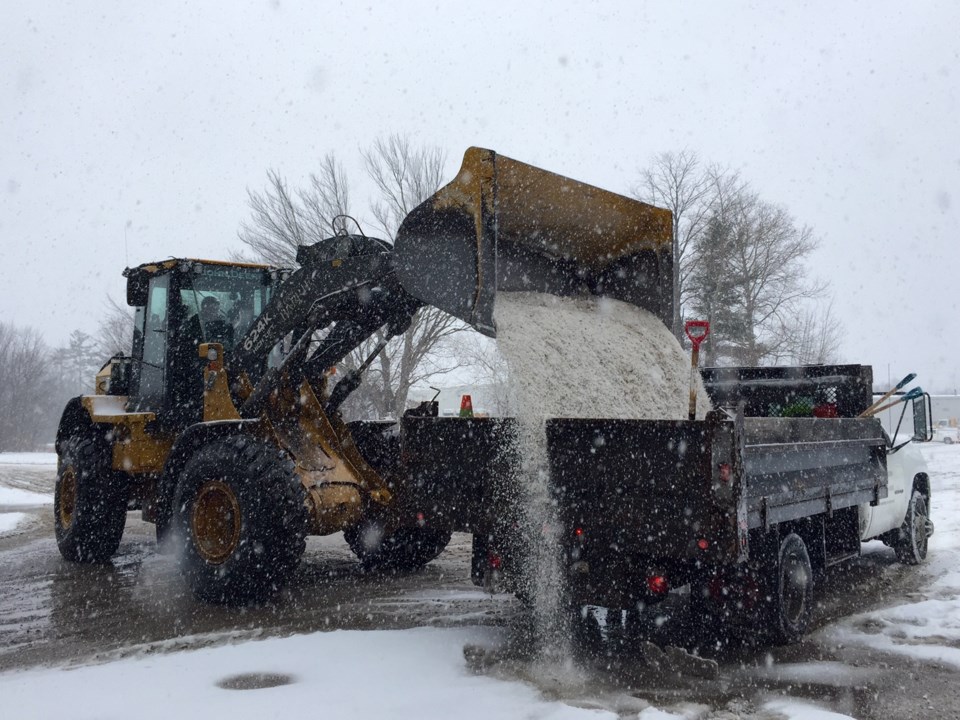It’s more than a sprinkling of salt that keeps Barrie’s roads safer in wintertime.
Craig Morton, the city’s senior manager of operations, roads and fleet, says many measures are used to melt snow and ice, and keep salt out of area lakes and streams.
“The city applies salt to keep our roads safe while balancing water protection,” he told BarrieToday. “Snow and ice are removed from roads and sidewalks by plowing rather than melting with salt when possible to reduce the amount of salt required.
“A second night shift was added to provide around-the-clock service and remove ice and snow before accumulations can develop and bond to paved surfaces," Morton added.
The city road operations department's average salt use for the 2022-23 season was reduced by 29 per cent, and it was cut by 22 per cent during the first four months of 2024, in comparison to the previous five-year average.
This equates to reducing the amount of salt used for the 2022-23 season by 7,141 tonnes or $460,600, and by 3,249 tonnes or $209,500 for the first four months of 2024, when compared to the previous five-year average — with adjustments to reflect today’s cost per tonne of salt.
“Roads with larger volumes of traffic, or those with steep hills, are the only roads that receive salt,” Morton said, “while residential roads are treated with sand and six per cent salt mixture.
"The city pre-wets rock salt and uses organic additives to reduce the amount of salt required to treat snow and ice," he added.
Morton says the city also employs proactive salting measures, or direct liquid application, to prevent a snow and ice bond from forming on pavement.
“This is more effective than using it reactively to break an ice bond,” he said.
The city also has sophisticated weather-monitoring equipment that allows for precise response of salt application rates to optimize salt use across four distinct weather zones in Barrie.
The city provides annual operator training and ongoing monitoring to ensure that the right material is applied, at the right time, in the right amount, to Barrie’s streets.
Across this province, efforts are also being made to limit salt on streets and highways, and keep it out of waterways.
The Ontario Salt Pollution Coalition says many freshwater rivers, lakes and aquifers are facing serious, chronic and rising salt pollution.
Enough time has passed to determine that Ontario guidelines on salt are not adequately protecting water, the coalition says, as salt levels continue to rise in ground and surface water.
“The simple equation is more roads equals more salt, and it's going to kill Lake Simcoe if we don't treat it like the emergency it is,” said Claire Malcolmson, executive director of the Rescue Lake Simcoe Coalition. “This (Ontario) government's sprawl and highway-building obsessions are environmentally devastating.
"We need them to do a lot more if we are to protect our fresh water," she added. “What we want people to understand is the ecosystem on which we rely does not manage salt well."
Malcolmson says government research shows Ontario is responsible for 2.2 of the five million tonnes of salt applied in Canada annually.
And that concentrations of chloride, which contains salts, in monitored streams increased by about two-fold from the 1960s to 2022.
The Rescue Lake Simcoe Coalition is a member of the Ontario Salt Pollution Coalition.
In February it will start a provincial campaign asking municipalities to pass a resolution supporting a number of measures.
The coalition wants to establish a multi-stakeholder advisory committee to guide and inform provincial action on road salt.
Also to address the on-going harm of winter salt application to water and water-based ecosystems.
This includes a commitment to substantial salt reduction in the short-term and completely phasing out the use of salt in the long-term, in favour of sustainable physical, chemical, non-toxic and practical alternatives. The latter includes requiring snow tires and increased plowing of streets.
Public funds should also be used for water conservation and public education, the coalition says.
For more information, visit saltcoalition.ca.

